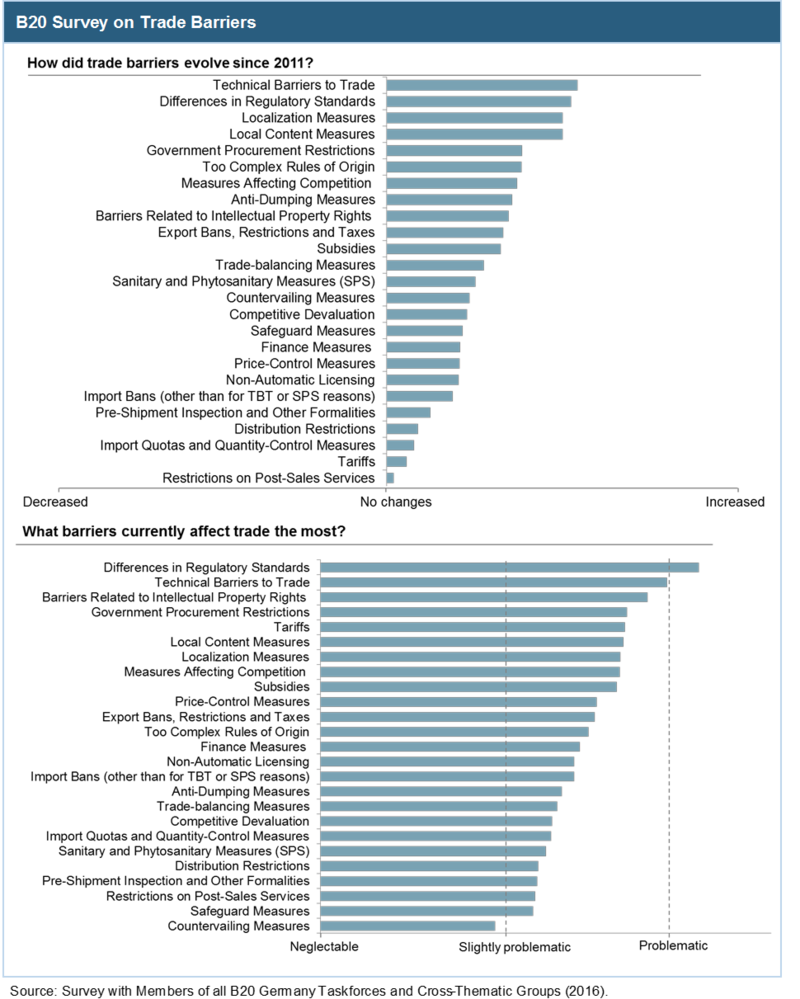The G20 is more important than ever to keep protectionism at bay and to secure open markets and rules-based trade. As early as 2008, the G20 committed to a standstill and rollback on protectionist measures: the members agreed not to introduce new barriers to trade and to remove existing barriers. The monitoring of the G20 trade measures by the World Trade Organization (WTO) shows, however, that the protectionism standstill has never been effectively implemented to at any time. Since 2008, G20 members have introduced over 1,600 new trade-restricting measures, of which more than 1,200 are currently in force – the trend has been unbroken for years. Since some G20 members inform the WTO insufficiently about their trade policy measures, the actual number is probably much higher. The G20 has to make a greater effort to curb protectionism.
To evaluate the trend in trade policies from a business perspective, the B20 conducted a survey among its members, which represent all G20 economies and economic sectors. The results were presented by B20 Sherpa Stormy Mildner to the G20 Trade & Investment Working Group
The results do not only confirm that trade barriers have been rising across the board: Not a single one of the 25 surveyed trade-restrictive measures have decreased over the past five years according to B20 members. The survey results also give several lessons how the main instrument of the G20 to enforce the protectionism standstill and rollback – the WTO monitoring and its biannually published report on G20 trade measures – needs to be strengthened and refined.
First of all, trade barriers have significantly discrepant effects according to survey results. The WTO monitoring only classifies trade barriers into four categories (“trade remedy”, “import”, “export”, “other”), which does not allow for a clear view on current trends in trade policies, notably non-tariff barriers. Therefore, the WTO report on G20 trade measures should include a much more concise categorization of observed non-tariff barriers. A common, agreed-upon basis might be the UNCTAD classification of non-tariff barriers of 2012.
Second, the B20 survey underlines that the mere quantity of specific trade-restrictive measures alone does not tell much about their consequences. The vast majority of the rise in the number of G20 trade-restrictive measures is due to trade remedies according to the WTO monitoring. While the survey results show that these do restrict trade, many other barriers are seen as having a much more negative effect on imports and exports. The WTO report on G20 trade measures should, therefore, include evaluations of the impact specific trade-restrictive or -facilitating measures have on trade, growth, and jobs. This would allow for the necessary commonly accepted reference what barriers/facilitation have the most harmful/beneficial impact and whose tackling/introduction should, therefore, be prioritized by G20 governments. Consultation of business, labor, and consumer representatives in this regard would enhance the quality and meaningfulness of such analyses.
A greater focus on the real impact of trade barriers is needed to enable governments and international organizations to prioritize the fight against protectionism. Too often, the public discussion focuses solely on the benefits of exports, while the positive effects of imports are not sufficiently taken into account. Imports increase productivity, innovation, and competitiveness. Over 50 percent of the globally exported goods are traded at least twice across borders before they reach the final consumer. Above all, they are an essential prosperity driver by increasing the purchasing power of consumers through greater product diversity at lower prices. Numerous studies show that especially the poorest households loose purchasing power and welfare through trade barriers.
The objective of trade policy must be to eliminate unnecessary barriers and to ensure that trade promotes fair competition through a rule-based global trading system. The G20 members should therefore develop a common understanding of the effects of trade barriers as well as the advantages and disadvantages of trade. To enable a fact-based public debate, which should be in the interest of all, governments and business must also better communicate the effects of trade and trade rules. And strategies need to be devised to ensure that trade benefits all.
If the G20 did not exist, it would have to be invented today. Our world economies are facing challenges that cannot be solved individually. National solo runs will not allow us to take full advantage of today’s opportunities or to solve our collective problems. Trade must be a top priority of the G20 Summit early July.

